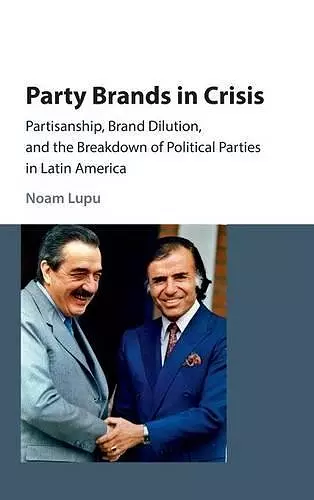Party Brands in Crisis
Partisanship, Brand Dilution, and the Breakdown of Political Parties in Latin America
Format:Hardback
Publisher:Cambridge University Press
Published:15th Jan '16
Currently unavailable, and unfortunately no date known when it will be back
This hardback is available in another edition too:
- Paperback£32.00(9781107423206)

Party Brands in Crisis offers a new way of thinking about how the behavior of political parties affects voters' attachments.
Why would national political parties that have been competitive for decades collapse overnight? Party Brands in Crisis offers an explanation that highlights the impact of elite actions on voter behavior. This study is aimed at scholars interested in voter partisanship, political behavior, Latin American politics, political parties, and elite polarization.Why have so many established political parties across Latin America collapsed in recent years? Party Brands in Crisis offers an explanation that highlights the effect of elite actions on voter behavior. During the 1980s and 1990s, political elites across the region implemented policies inconsistent with the traditional positions of their party, provoked internal party conflicts, and formed strange-bedfellow alliances with traditional rivals. These actions diluted party brands and eroded voter attachment. Without the assured support of a partisan base, parties became more susceptible to short-term retrospective voting, and voters without party attachments deserted incumbent parties when they performed poorly. Party Brands in Crisis offers the first general explanation of party breakdown in Latin America, reinforcing the interaction between elite behavior and mass attitudes.
'Why do established parties sometimes dramatically collapse, often within a single electoral cycle? Lupu's persuasive answer is that such collapse occurs when parties switch positions, make unholy alliances with former adversaries, and converge on the policy positions of their opponents in order to attract floating voters and win the next election. When leaders thus 'dilute the party brand', parties hemorrhage partisans and are in turn left defenseless against the wrath of the electorate in hard times. Party Brands in Crisis challenges the way we think about partisanship and deserves to be read by students of political parties everywhere.' Frances Hagopian, Harvard University, Massachusetts
'Why do long-lasting parties collapse? In answering this question Lupu demonstrates how, as the result of strategic decisions made by the party elite, party brands can become diluted and voter attachments to parties can become attenuated. This is a book every scholar of parties will want to read. It promises to help reshape the way we think and talk about party labels and partisan loyalty.' Allen Hicken, University of Michigan
'Party Brands in Crisis may be the most important book on Latin American parties published in a generation. It offers a compelling theory - and an impressive array of evidence - to explain why many established parties have weakened or collapsed in Latin America over the last quarter century. In so doing, it highlights a crucial consequence of the region's programmatic convergence during the 1990s: parties that embraced the Washington Consensus diluted their brands and, consequently, ceased to stand for anything in the eyes of their supporters. Party Brands in Crisis is destined to become a classic work in the literature on political parties. It will be a must-read not only for scholars of Latin American politics but for anyone interested in political parties.' Steven Levitsky, Harvard University, Massachusetts
'Lupu provides here a very significant contribution to the literature on political parties, and especially to our understanding of Latin American politics. He develops a novel and insightful theory about party brands and their erosion based on ideological convergence and negative performance. He tests the implications of his theory making an impressive use of multiple methodologies to explain party breakdown in Latin America. Moreover, the implications of his study go beyond the region as suggested by his exploration of the relationship between polarization and party brands. In sum, this book is most likely to generate a new research agenda for the study of political parties, which will have a long-lasting effect on the discipline.' M. Victoria Murillo, Columbia University, New York
ISBN: 9781107073609
Dimensions: 235mm x 158mm x 23mm
Weight: 560g
264 pages